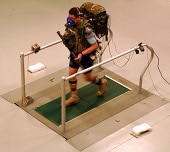The world’s attention will be focused on Apple this week and on the topic of wearables. In an event on Tuesday, the Cupertino company is planning to unveil the latest additions to its popular iPhone line along with a wearable device that most folks are just calling the ‘iWatch.’ But as Apple wrestles with the security of its growing stable of mobile devices and the cloud infrastructure that supports them, what will the impact of wearables be? Well, the folks over at Trend Micro are putting together a series of blog posts that look at that very question. Namely: the (information) security implications of wearables. It makes for some interesting reading. Among other things, Trend There are three very broad categories that we can use to describe what we are talking about. The posts, by Senior Threat Researcher David Sancho, break down the wearables space into three categories: ‘IN’ devices like sensors, ‘OUT’ […]
Tag: wearable computing
Can Google Hold Back Facial Recognition For Glass?
The New Yorker blog has an interesting, short piece by Betsy Morais on the challenges posed by facial recognition and wearable technology that’s worth reading. The post, “Through a Face Scanner, Darkly” picks up on recent reports about a proliferation of facial recognition applications for the Google Glass platform, addressing the ethical implications of the intersection of wearable technology with powerful sensors and analytics capabilities, including facial recognition. Specifically, Morais zeros in on an app called NameTag that adds a face scanner to the Glass. “Snap a photo of a passerby, then wait a minute as the image is sent up to the company’s database and a match is hunted down. The results load in front of your left eye, a selection of personal details that might include someone’s name, occupation, Facebook and/or Twitter profile, and, conveniently, whether there’s a corresponding entry in the national sex-offender registry,” Morais writes. NameTag’s focus […]
Microsoft Tests Glass Competitor. But Do Wearables Threaten Privacy, Social Norms?
Forbes has a really interesting article a couple of days back that posited the huge dislocations caused by wearable technology – including front-on challenges to social norms that are thousands of years in the making and contemporary notions of privacy. The applications for wearable technology like Google Glass are too numerous to mention. Just a few include “heads up” displays for surgeons in the operating room. Teachers (or their students) could benefit from having notes displayed in their field of vision, rather than having to resort to printed notes or the (dreaded) Powerpoint slide. But the devil is in the details of the wearable technology, Forbes argues. Unlike external devices – pagers, mobile phones, smart phones – wearable tech is more intimately connected to ourselves: in constant contact with our bodies and notifying us with vibrations and sounds in ways that it may be difficult to ignore, Forbes argues. Indelicately implemented, […]
DARPA Tests Smart, Augmenting Uniform
Everyone on the Left Coast is tweeting about Google Glass this week. But, let’s face it, @projectglass is really about dis-intermediating the viewing screen. Now, over at DARPA’s Web site, we really get to see what the future of intelligent apparel looks like, namely: the DARPA Warrior Web, a next generation augmenting and intelligent uniform. DARPA on Wednesday released photos and a video of a soldier wearing a Warrior Web prototype, which augments “the soldier’s own muscles to significantly boost endurance, carrying capacity and overall war fighter effectiveness.” The prototype shown is one of many under evaluation by the Army with the goal of providing increased protection to soldiers and reducing the “metabolic cost of carrying a typical assault load” – which is often in excess of 100 lbs, according to DARPA. Muscular-skeletal injuries due to wear and tear are a leading cause of soldiers not being deployed to action. Of course, […]



